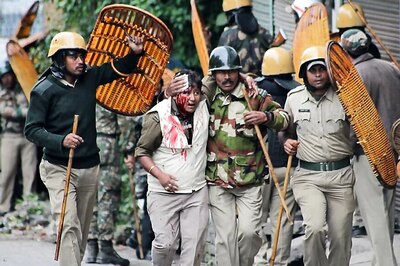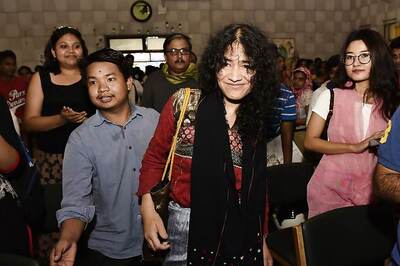
views
The Tashkent Files
Director: Vivek Agnihotri
Cast: Naseeruddin Shah, Mithun Chakraborty, Shweta Basu Prasad, Pankaj Tripathi, Mandira Bedi, Pallavi Joshi
The Tashkent Files based on the conspiracy theory around former Prime Minister Lal Bahadur Shastri's mysterious death in Tashkent sets its goals fairly low. Instead of aiming to tell an intriguing story — after all, what is a better plot than drama in real life — it quite evidently aims to open a can of worms during election season.
There was an opportunity here for a good political thriller like JFK in which Kevin Costner as district attorney Jim Garrison, investigates the conspiracy surrounding Kennedy's assassination. But Vivek Agnihotri, both writer and director of The Tashkent Files in an inept bid to make a case for state-sponsored murder (under Congress rule) lets the golden opportunity slip away. And given the bunch of talented actors that he has at his disposal — Naseeruddin Shah, Pallavi Joshi, Shweta Prasad Basu, Mithun Chakraborty, Prakash Belawadi, Pankaj Tripathi — this one certainly is a criminal waste.
The film starts with a bright young journalist Ragini Phule (Shweta Basu Prasad) looking for a scoop and the universe conspires to give her one. A mysterious voice on the phone beckons her to examine the devious conspiracy behind Shastri's death in order to shake the establishment. Warming up to the idea, she sets off on the chase and scrambles around looking for evidence to prove that the former PM’s death was a murder. And voila, she has a scoop on hand! One that gets her invites to discussions and interviews on news channels as well as on a committee set up to determine the truth of Shastri's mysterious death.
She unearths these critical bits by dashing off to Tashkent and meeting a former spy to piece together the answers as also by referencing books written by former KGB agents. She asks mind-numbingly deep questions which loosely translates into "Can you imagine what the country would have been if Shastri would have been alive?"
Naseeruddin Shah and Mithun Chakraborty play wily politicians – home minister Natarajan and Shyam Sundar Tripathi - with muddled motives who are brought to the negotiating table because of the aforementioned scoop. The route to their ambitions for some reason lies in forming a committee.
The committee comprises of a historian (Joshi), a scribe (Ragini), a scientist (Tripathi), a RAW Chief (Belawadi), a gasping NGO activist (Mandira Bedi), and it is headed by Tripathi (Chakraborty). The characters and their alignment with the powers that be are sketchy and unconvincing. For the sake of objectivity and fair play, Pallavi Joshi is cast in the role of the left-leaning historian who is convinced that the conspiracy theory is bunkum.
Most of the film comprises of the unconvincing arguments and bickering among members of the committee making it a dull and drab watch. There is one scene in which Tripathi (Chakraborty) launches into a tirade about different kinds of terrorists that exist, such as intellectual terrorists, TRP terrorists, judicial terrorists and so on — watching that exchange is about as exciting as watching paint dry and unfortunately, the same holds true for most of the film.
Claims from a bunch of books like Political Mysteries, Conversations with the Crow (interviews with former CIA chief Robert Trumbull Crowley, Mitrokhin Archive (KGB agent Vasili Mitrokhin’s accounts) find significant mention in the film but none of it is weaved convincingly into the screenplay.
In films such as The Tashkent Files, mixing facts and fiction in the interest of a telling a good dramatic story is par for the course. There have been a few attempts at conspiracy-theory films in India over the last few years which could all have been great movie-making material in the hands of good storytellers.
By eschewing the tenets of effective filmmaking, The Tashkent Files fails to get both, the fact and fiction right.
Rating: 1/5




















Comments
0 comment